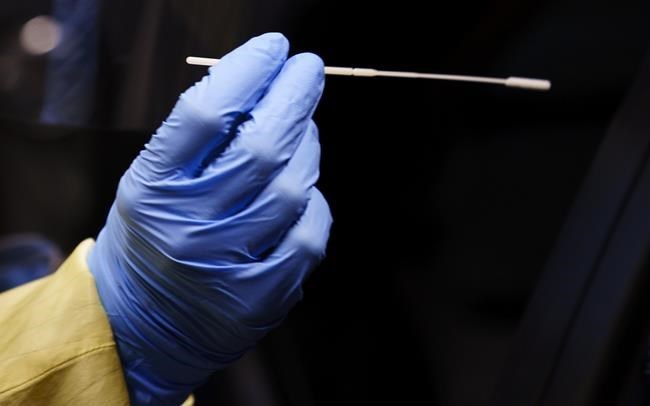A COVID-19 outbreak at a Quebec pork-processing plant grew Thursday as Manitoba expanded its restrictions and Alberta announced a testing pilot at two international border crossings that it hopes will eventually boost its ailing travel industry.
Olymel said 62 workers at its plant southeast of Quebec City had tested positive for the novel coronavirus.
The union representing plant workers is calling for a temporary closure, but the company says it is following guidance from public health officials who have not recommended a shutdown.
One worker died following a positive test result, but it wasn't yet determined whether the death was due to the novel coronavirus.
Quebec, the province hardest-hit by COVID-19, reported 1,033 new cases Thursday and 20 additional deaths. Five hundred and fifty-three people were in hospital, including 101 in intensive care.
Premier Francois Legault said chances are slim restaurants in Quebec’s largest cities will be allowed to reopen this month as the province continue to report daily case increases in the quadruple digits.
Montreal and Quebec City have been under a 28-day partial lockdown since Oct. 1.
“At this time, we need to reduce even the risk of contact because we cannot afford to continue having about 1,000 new cases every day,” Legault said.
Manitoba reported four COVID-19 fatalities on Thursday in its deadliest day yet.
Dr. Brent Roussin, the chief provincial public health officer, announced 147 new cases — 87 in Winnipeg, where more restrictions on restaurants, pubs and gathering sizes came into effect this week.
He said the measures will also apply to the northern health region and Churchill starting next week. Extra measures are being put in place for schools in the Winnipeg area and the north starting Monday, including cancelling field trips, banning choirs and wind instruments and requiring substitute teachers to wear medical masks.
Manitoba's daily test positivity rate is up to 5.6 per cent.
“We have to change things. We fell back on the fundamentals," Roussin said. “We got back to all that normalcy that we want, but we just know this is what happens when we attempt that.”
Also Thursday, the European Union's council reimposed a travel ban on Canada, reversing a decision in June that lifted entry restrictions on a number of non-EU countries. Europe is battling a second wave of the pandemic.
In Alberta, Premier Jason Kenney announced a joint federal-provincial pilot project that will enable international travellers re-entering Canada via the Calgary International Airport or the Coutts land border crossing from Montana to avoid a full 14-day quarantine. Instead, they would only have to isolate for a matter of days.
The pilot is to begin on Nov. 2 and is open to asymptomatic travellers returning to Canada who are Canadian citizens, permanent residents or foreign nationals permitted to enter Canada.
"Though a lot of work lies ahead, we can see a return to normal travel," said Kenney. "The results will help shape provincial and federal policy and ultimately they'll help to find a new approach for international travel."
Those who voluntarily participate will receive a COVID-19 test upon entry into Canada before going into quarantine. If the result is negative, they can leave, as long as they promise to get tested six or seven days later at a pharmacy.
Participants will be subject to daily symptom checks and will have to wear masks in public places and avoid visiting high-risk groups.
Anyone who chooses not to get a test will still have to quarantine for two weeks.
Kenney said the provincial tourism industry has suffered a 63 per cent drop in spending this year. He also noted that three per cent of the province's active cases were acquired through travel.
"We must find ways to bring back safe travel if we're ever going to get the economy firing again on all cylinders."
Kenney made his remarks by phone as he was self-isolating at home. The premier tested negative for the novel coronavirus on Wednesday, but said he will remain in isolation for another week.
Kenney attended events with Municipal Affairs Minister Tracy Allard, who contracted COVID-19 last week.
Alberta reported 427 new infections in Thursday's update, a new record and the second day in a row its daily case count breached the 400 mark. Its test positivity rate was at three per cent on Wednesday.
Ontario Premier Doug Ford said his government is keeping a "sharp eye" on the Alberta border pilot project.
"I'd be open to it, but I just first want to see what's happening in Calgary," said Ford, who noted that Pearson International Airport in Toronto gets far more volume and international traffic.
Ontario reported 841 new cases of COVID-19 on Thursday as two more Toronto hospitals declared outbreaks.
Canada's most populous province also recorded nine more deaths and had a daily test positivity rate of 2.5 per cent.
Two hundred and seventy people were in hospital, including 74 in intensive care and 48 on ventilators.
The Scarborough Health Network said six patients were infected in one unit at its general hospital, and the University Health Network said it was dealing with an outbreak involving four patients at the Toronto Rehabilitation Institute.
St. Michael's Hospital, St. Joseph's Health Centre, Toronto Western Hospital and the Centre for Addiction and Mental Health have also declared outbreaks among staff or patients.
This report by The Canadian Press was first published Oct. 22, 2020.
Lauren Krugel, The Canadian Press




